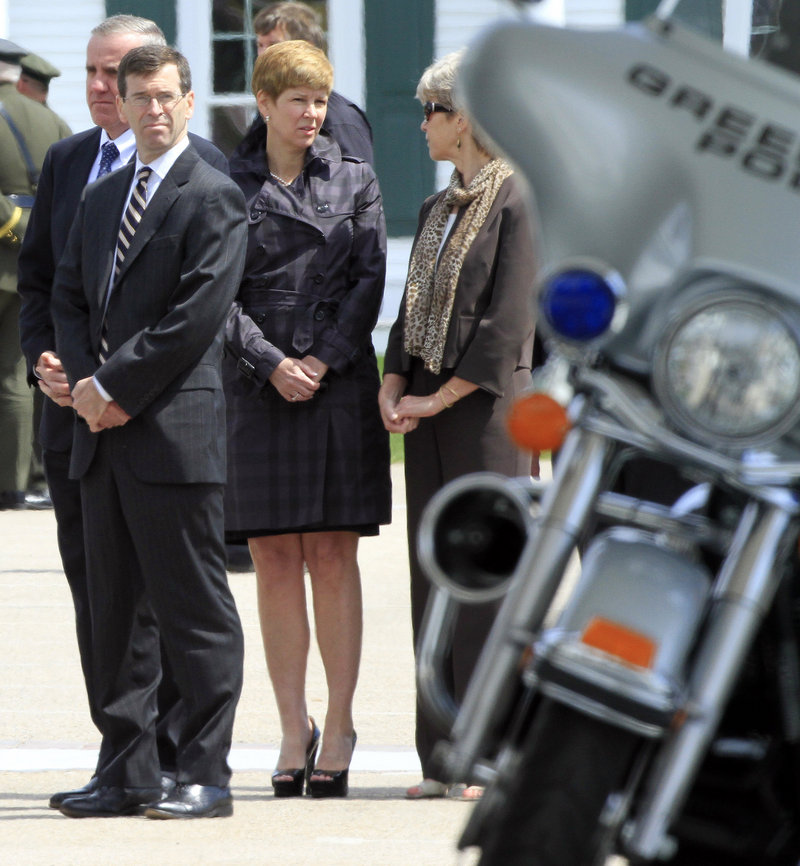CONCORD, N.H. – A drug raid last month in Greenland where a police chief was shot to death and four officers were wounded put the spotlight on a statewide drug task force that prefers to work in the dark.
The New Hampshire attorney general’s drug task force numbers 20 to 24 officers on loan from law enforcement agencies statewide. They usually spend at least two years with the task force, undergoing intensive training and infiltrating drug trafficking operations throughout the state.
“All their work is undercover,” Attorney General Michael Delaney said in an interview. “To be successful it’s designed not to receive a lot of attention.”
“It isn’t surprising to me that our average citizens would not be aware of their work until a tragic event like the one in Greenland calls attention to it,” Delaney said.
In Greenland, the drug raid and the violence that it sparked rocked the town of 3,000, where its own seven-member police force was more accustomed to reports of burglar alarms and barking dogs than violent crime.
On April 12, six members of the state task force were attempting to search the Greenland home of Cullen Mutrie, who was suspected of dealing hundreds of oxycodone pills a week. As officers kicked down the door, Mutrie opened fire. Four officers were wounded, and Greenland Police Chief Michael Maloney, who helped the wounded officers to safety, was fatally shot in the head as he crouched behind his cruiser. Mutrie later shot to death his girlfriend, then killed himself.
Last week, Delaney launched a review of the firefight and events leading up to it, looking for answers that can benefit all law enforcement.
“It’s extremely dangerous work,” Delaney said. “These undercover officers leave their homes every day and communicate and interact with drug dealers and dangerous individuals.”
A score of police officers on loan to the task force continue to work undercover, making drug buys and cases. In 2010, task force members opened more than 1,000 cases, made 158 arrests and seized 68 weapons and $115,683 in cash. More than half the arrests were made in Sullivan and Cheshire counties.
The task force opened even more cases with drug buys or seizures in 2011, said Senior Assistant Attorney General Jane Young, who heads the criminal division. She said the weapons seized speak to the inherent danger of the work.
“It’s high stakes. Guns are the tools of the trade,” Young said. She said the task force focuses on street and mid-level dealers, while the federal Drug Enforcement Administration focuses on higher-level, multistate traffickers.
Now in its 26th year, the task force is divided into four teams along geographic lines: the Seacoast, the northern and western parts of the state and the metro corridor that encompasses Nashua, Manchester and Concord. The officers are on loan from small towns and large cities, sheriff’s departments and the State Police. Their home agencies continue to pay their salaries and provide their benefits, with some help from the attorney general’s office, an amount that fluctuates based on forfeitures and other factors.
Contributing agencies get a share of forfeiture and seizure money. More importantly, Delaney stresses, they get task force help and an officer who is trained and seasoned in undercover work.
Young and Delaney would not identify agencies that have officers on loan to the task force, but some departments make no secret of their involvement.
Newport Police Chief James Burroughs said it’s a huge commitment for his town of 6,500 residents and 18 sworn officers to commit a detective to the task force, but he said the benefits are “immeasurable.”
“It allows us the resources and mechanism to target people involved in illegal drug sales in our community and surrounding communities,” Burroughs said.
Burroughs said taking just one dealer off the street reduces other crimes associated with drug trafficking, such as burglary, theft and robbery.
“Crimes now know no boundaries,” Burroughs said. “A person who may be dealing narcotics in Newport is likely to be dealing in Sunapee and Claremont. You need a group of investigators who have the ability to travel and do those wide-ranging investigations and who aren’t restricted by jurisdiction.”
Because task force members are working for the attorney general, they have statewide jurisdiction.
Send questions/comments to the editors.



Success. Please wait for the page to reload. If the page does not reload within 5 seconds, please refresh the page.
Enter your email and password to access comments.
Hi, to comment on stories you must . This profile is in addition to your subscription and website login.
Already have a commenting profile? .
Invalid username/password.
Please check your email to confirm and complete your registration.
Only subscribers are eligible to post comments. Please subscribe or login first for digital access. Here’s why.
Use the form below to reset your password. When you've submitted your account email, we will send an email with a reset code.